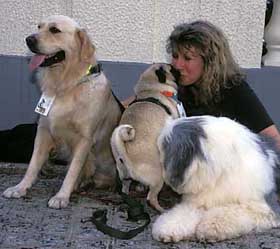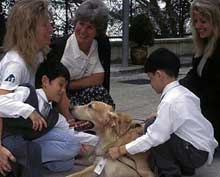Lim Hong-aun was severely depressed. A schizophrenic in his mid-40s, he had spent almost half his life in mental hostels in Singapore and Malaysia. Living in a hostel in Ipoh, he barely spoke to anyone and spent long periods lying in his room.
Then Dr M. Mahadevan, newly appointed head of Lim’s hostel, decided that many of his patients would benefit from visiting his neighbouring horse farm. Caring for horses, the doctor reasoned, might help long-institutionalised patients open up and interact with the outside world.
Lim was initially reluctant to leave the hostel, let alone go near horses. But with encouragement from the hostel staff, he began grooming, watering and walking the animals.
Before long, Lim started talking to the horses, telling them his troubles. He would smile when a horse nudged him for more food or acknowleged his presence with a whinny. Gradually, the contact with the animals encouraged Lim to open up to people. For the first time, he started talking to staff at the hostel.
Lim eventually moved to a nearby halfway house, where he continued to receive care but was free to come and go, then took a job helping to run Mahadevan’s home in Kuala Lumpur. “Hong-aun’s life has improved dramatically,” Mahadevan says. “There’s no question the horses brought him out of his withdrawn state.”
Science and the therapeutic value of animal companions
In the past 15 years, scientists the world over have established beyond doubt the therapeutic value of animal companions. In Cambridge, England, researchers discovered that, within a month of taking a cat or dog into their home, new owners reported a “highly significant” reduction in minor ailments.
The Baker Medical Research Institute in Melbourne, Australia, showed that the health benefits were more far-reaching still. A study of some 6000 patients revealed that those with pets had lower blood pressure, a lower cholesterol level and, as a result, a diminished risk of heart attack. And American researchers have established that, even after a heart attack, pet owners are more likely than other coronary patients to be alive a year later.
The reasons are simple, experts say. Pets help us reduce our state of arousal, which reduces blood pressure. We are fulfilling our most primitive and basic need – the need to touch.
Dr Yokoyama Akimitsu, head of the psychiatric unit at Kyosai Tachikawa Hospital in Tokyo, says pets can also help us by making us feel less lonely, by creating a feeling of being needed and by encouraging social contact with others interested in animals. They are also a stimulus for healthy exercise, keep us busy and make us feel safe.
When an earthquake devastated the Japanese city of Kobe in January 1995, thousands of people had to be housed in halls and gymnasiums. Despite rules barring animals from public buildings, officials let people bring their pets. “It was an eye-opening experience for everyone,” says Dr Gen Kato, president of the Japanese Animal Hospital Association. “People who had pets were clearly more happy and coped better with the disaster.”
Medical establishments in Asia are increasingly recognising the value of animal companions. An animal-therapy programme run by the Japanese Animal Hospital Association has over 900 volunteers who take their dogs, cats and other animals into 160 hospitals, children’s homes and retirement centres through-out the country each month. A similar scheme in Hong Kong, “Doctor Dog,” has spread to the Philippines, Taiwan and mainland China.

Certainly, the value of companion animals is obvious to anyone who witnesses an animal-therapy programme in action. At the first “Doctor Dog” session in China, the group’s founder, Jill Robinson, watched with the vice-mayor of Beijing, local of-ficials and nursing staff as hospital patients were introduced to the dogs. One young girl with Down’s syndrome, who was extremely shy of strangers, nervously approached. Within minutes she was stroking the dogs and laughing. At the end of the session she sang to the vice-mayor. “She’s never done anything like this before,” the girl’s mother told Robinson.
Health professionals have started to recognise the fact that pets do more than pills for the elderly. A Japanese Animal Hospital Association study of people over 65 found that pet owners made up to 30 per cent fewer visits to doctors than those who had no pet.

Dr John Wedderburn, a Hong Kong-based animal welfare campaigner and medical practitioner, says: “We all crave affection, but sometimes we find we have difficulty obtaining it from other people. Companion animals provide friendship, constancy and love. They’re always there, always happy to see you.”
Children with mental or physical handicaps have an especially strong bond with animals. A cat named Manis is a favourite in an animal-therapy programme at Selangor Cheshire Home’s Community-Based Rehabilitation Programme, which cares for disabled people. Children who have trouble walking make astonishing efforts to maintain their balance so they can play with him; those whose heads loll uncontrollably from side to side work to maintain eye contact. “It’s very therapeutic,” says Puan Khatijah Sulieman, who runs the home. “The children have an animal they can love, and they feel loved in return.”
In Britain, some prisons now encourage inmates to keep pets – caged birds, tropical fish, even cats. These can be a magical ingredient to bring about long-term changes in attitudes and behaviour, with prisoners often finding out for the first time what it’s like to give and receive affection.
For some people, animals can provide more consistent emotional support than humans. A Warwich University, England, study found that people who are poor at confiding in others, showing love or making friends were able to lavish affection on a pet.
In Hong Kong, Sue Rogers, a former psychology student at Hong Kong University, found that mentally disabled adults became more outgoing and displayed more initiative when “Doctor Dog” animals visited them three times a week.
An intriguing discovery is that some dogs can predict epileptic seizures, apparently by detecting subtle changes in their owners. Andrew Edney, a British veterinarian, studied 37 pet dogs that reacted to their owners’ impending fits. Some became anxious or restless; others nuzzled their owners, stood guard over them or ran to fetch people.
A Briton, John Stoddart, is epileptic and asthmatic. Before he took Bruno, a Jack Russell terrier, into his home, there was the ever-present fear that he would have a seizure and choke on his tongue while unconscious. “But with Bruno around, I know I’ll be safe.”
When the dog jumps up at him and gives what Stoddart describes as “a wimpish yap,” he knows he has ten to 15 minutes to lie down on the floor in anticipation of a fit. “I’ve lost count of how often he has saved me from serious injury or worse.”
Whether we pamper our pets or depend on them, few of us would quarrel with the World Health Organisation’s pronouncement that companion creatures bring us immense benefits. But for some, this comes as a revelation.
Shirley Cheung was initially opposed to her daughter, Alice, bringing a dog into their Hong Kong flat, saying she wouldn’t have the time or patience to look after a pet. But when Alice bought a Yorkshire terrier, Shirley warmed to the friendly and playful animal and soon bought a second dog, a Maltese terrier.
A few years later, after Alice had moved out with the dogs, Shirley’s husband died. Grieving and alone, Shirley rarely left the flat. Concerned for her mother’s wellbeing, Alice moved back into the family home, bringing the dogs with her. When Alice went to work, Shirley spent much of her time looking after the animals – fixing their favourite meals, playing with them and grooming them. Playing mother to the dogs, she says, helped her to overcome the pain of her husband’s death.
Alice has since returned to her own flat. But she takes the dogs to stay with Shirley two or three days a week. Echoing the sentiments of many pet lovers, Shirley says the dogs have given her boundless joy and love. “My life is so much better now, thanks to the animals.”
[This article appeared in the August 2000 Asian edition of Reader’s Digest. Reader’s Digest holds copyright in the text.]
Adapted from an article by Peter Browne
